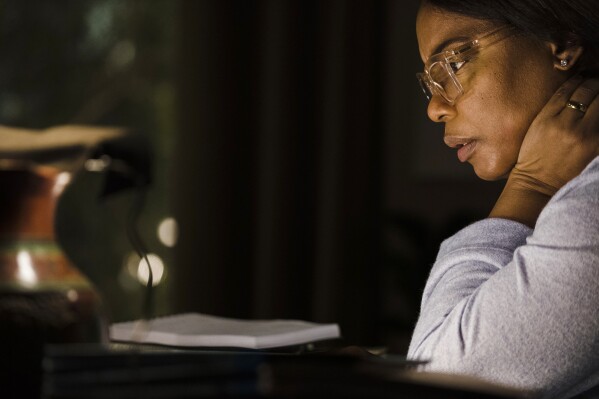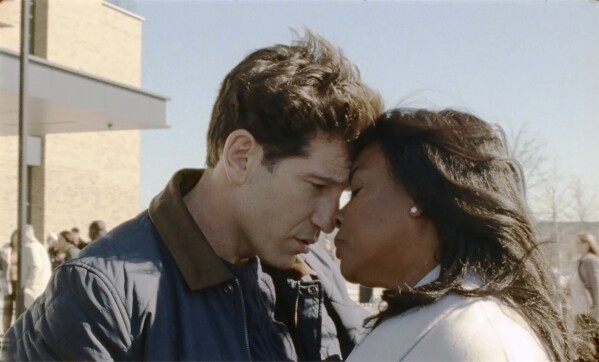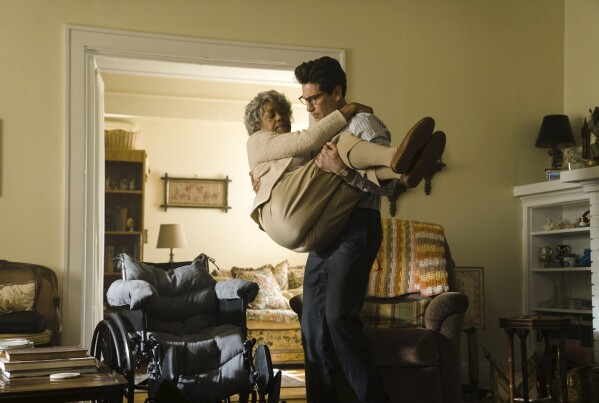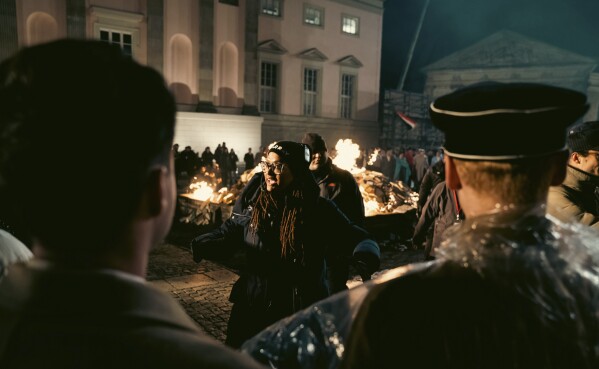In ‘Origin,’ Ava DuVernay and Aunjanue Ellis-Taylor seek the roots of racism
Ava DuVernay has been disappointed that “Origin” and its star Aunjanue Ellis-Taylor haven’t been recognized during Hollywood’s awards season so far, but says: “Time will reward the film for its merits.”
BY JAKE COYLE
January 22, 2024
NEW YORK (AP) — Ava DuVernay kept hearing she had to read “Caste: The Origins of Our Discontents.” She had Isabel Wilkerson’s book in galleys before it was published in 2020. Oprah Winfrey kept telling her to read it. But she put it off. It seemed an imposing read. Copies kept proliferating in her home.
“At one point, a high-profile director said to me, ‘I heard you got the book,’” DuVernay says. “And I was like, ‘Yeah, I got a couple copies.’ He said, ‘No, I heard you’re doing it.’ I said, ‘As in doing a movie?’ So I said I better read this.”
But even once she cracked Wilkerson’s book open, it took DuVernay a few reads before it really sunk in. “Caste,” a best-seller released shortly before the death of George Floyd, reframed American racism through historical stratifications of caste. “Race, in the United States, is the visible agent of the unseen force of caste,” wrote Wilkerson. “Caste is the bones, race the skin.”
For DuVernay, whose films ( “The 13th,”“Selma” ) have illuminated American history with rigor and passion, the thesis of “Caste” was eye-opening.
“I was so wrapped up with the idea of race as a Black woman. That was the lens through which I see myself and the world sees me,” says DuVernay. “That’s what I thought.”
“Origin,” DuVernay’s new film, isn’t a direct adaptation of Wilkerson’s book. DuVernay, who wrote the script, centers it on Wilkerson (Aunjanue Ellis-Taylor), following the author while she researches the book and navigates her own personal joys and tragedies. The film takes a heavyweight work of historical and sociological inquiry and transforms it into a deeply humanistic drama and a globe-trotting detective story.
“She’s Indiana Jones. She’s going around the world in search of the holy grail,” says Ellis-Taylor. “She’s on this process of discovery and then in the middle of that worldwide hunt, she loses, and her loss is immeasurable. But she’s still searching. That is a hero. That is a cinematic hero.”
DuVernay and Ellis-Taylor met for an interview last month in the downtown offices of Neon, which is releasing “Origin” theatrically Friday. They had only just begun talking about their still-fresh experience making the film. Ellis-Taylor hadn’t yet seen it and wasn’t sure she was going to. “It was so personal for me,” she said. “I don’t want to share it with anybody yet.”
Some have overlooked “Origin” since its Venice Film Festival debut. DuVernay has lamented Ellis-Taylor’s absence thus far from the pomp of award season. But underestimating “Origin” would be a mistake. The film, which made numerous 10 lists including this critic’s, is audaciously original in how it fuses big ideas with emotional warmth.
If “Caste” sought to describe some of the man-made hierarchies that repeat throughout history, “Origin” – which DuVernay and her producing partner, Paul Garnes, gathered financing for independently – is itself a work that boldly and beautifully transcends conventional Hollywood limitations.
DuVernay and Garnes raised $38 million with the help of philanthropists — including the Ford Foundation, the MacArthur Foundation and the Robert Wood Johnson Foundation — many of whom had little Hollywood experience but believed in the movie. Melinda Gates is a producer. NBA stars like Chris Paul invested.
“We are in an industry and a society where everything has a label. If there’s a Black woman director and a Black woman lead, it has to be about things they care about,” DuVernay says. “My hope is that we can somehow break caste.”
“Origin” opens with a dramatic recreation of the shooting of Trayvon Martin and later dips into historical vignettes including Nazi Germany, Jim Crow-era Mississippi and the experience of the Dalits in India. It steps into stories from history while capturing Wilkerson’s life with her husband (Jon Bernthal) and mother (Emily Yancy) – intimate dramas that touchingly counter and clarify some of the social structures Wilkerson traces while seeking the roots of racism.
“I wanted something where her intimate personal journey ran alongside, mirrored, challenged and actually complemented this huge universal truth that we don’t really know,” DuVernay says. “And I felt like somewhere in there, there were touch points where they could complement each other. One doesn’t always lead perfectly into other, but that they were in a conversation.”
Ellis-Taylor, the Oscar-nominated co-star of “King Richard,” had acted in DuVernay’s 2019 miniseries “When They See Us,” about the 1989 Central Park jogger case. She signed on to “Origin” without a script. “I had read ‘The Warmth of Other Suns,’” she says, alluding to Wilkerson’s prior book. “So how bad could it be?”
DuVernay describes the making of “Origin” as centered on her work with Ellis-Taylor, a collaboration founded on their mutual personal connection to the material.
“These things that she speaks about in her pillars of caste, that’s stuff I lived with. They’re not abstract ideas. That’s my reality,” says Ellis-Taylor, who was raised in Mississippi.
Seeing race as a caste was, to Ellis-Taylor, a revelatory new paradigm.
“That excites me. That sets me on fire,” she says. “And I believe this film is a dangerous film. If it does the work that I want it to do in theaters, it should make people angry. It should make people mad. I felt myself as being a soldier in that battle.”
DuVernay, too, describes herself as ready for “ugly feedback” to the film. A prominent proponent of inclusivity in cinema and the first African American woman to direct a $100 million-budgeted live-action film, she’s accustomed to the cultural battles that often accompany frank discussions of race.
“I am used to it. But on ‘Selma’ I was unprepared and it hurt me. It hurt me when people came at me about LBJ (on ‘Selma’) and that I’m tearing down people’s legacy and that I’m wrong and how dare I do this and that when I was advancing the perspective of a group of people that usually don’t have a story told from their point of view,” says DuVernay. “It seems whenever I do that, I’m wrong. I’ve felt that vitriol and felt that anger.”
“In this, I’m prepared for it in a way I hadn’t been before,” DuVernay adds. “And my preparation involves: Deal with it. I’m not going to fight you. It’s in there. Have at it.”
Yet the most common reaction to “Origin” from audiences has been an outpouring of emotion. Moviegoers often come out of the theater drying their eyes. Far from academic, the movie’s power builds through its straightforward humanity – what DuVernay calls “15 little love stories.”
In between are some painful historic episodes. Yet even filming those – like the Martin shooting – the director doesn’t find agonizing.
“My experience in shooting these kinds of films before has given me a set of muscles and tools where it doesn’t bother me, and I actually feel empowered and bolstered because I get to be the teller of these stories,” says DuVernay.
“Origin” was shot quickly, in 37 days across three countries during early 2023. DuVernay turned it around quickly, completing the edit in time for Venice in September. It was a fast enough process that Ellis-Taylor has trouble locating it chronologically in her mind.
“I think I know why,” she says. “Because it doesn’t feel real. It feels like a miracle.”
DuVernay calls “Origin” the film she’s proudest of, partly because of how she made it outside the studio system. Each film before has felt to DuVernay, who started in the industry as a publicist, like a test, either to herself or to prove her talent behind the camera. Her last movie, “A Wrinkle in Time, ” for the Walt Disney Co., adapted a famously difficult-to-adapt novel. The experience of “Origin” – while no less daunting -- was different.
“For me, it’s shifted everything I know about myself and my work. To be working with a freedom and an abandon yet a sense of certainty in my skills. To not feel like ‘Oh, I didn’t go to film school and I’m just skating by,’” DuVernay says. “This was just free.”
___
In a story published Jan. 17, 2024, about the movie “Origin,” The Associated Press erroneously reported the name of actor Aunjanue Ellis-Taylor. It was updated Jan. 19, 2024, to correct her first name to Aunjanue.
___
Follow AP Film Writer Jake Coyle at: http://twitter.com/jakecoyleAP

JAKE COYLE
Film writer and critic
Movie Review: Ava DuVernay’s ‘Origin’ is a powerful, artful, interpretation of ‘Caste’

This image released by Neon shows Aunjanue Ellis-Taylor in a scene from “Origin.” (Atsushi Nishijima/Neon via AP)

This image released by Neon shows Jon Bernthal, left, and Aunjanue Ellis-Taylor in a scene from “Origin.” (Atsushi Nishijima/Neon via AP)

This image released by Neon shows Emily Yancy , left, and Jon Bernthal in a scene from “Origin.” (Atsushi Nishijima/Neon via AP)

This image released by Neon shows director Ava DuVernay, center, on the set of “Origin.” (Atsushi Nishijima/Neon via AP)
BY LINDSEY BAHR
January 17, 2024
Words like “important” and “vital” are thrown around possibly a little too much in film criticism. It’s not that we don’t mean it — it’s just that sometimes we (ok, I) can get a bit excited. And when watching and reviewing good films in real time, it’s impossible to know what is yet to come. Will there be something else that makes that superlative seem silly in retrospect? Often times, yes.
Ava DuVernay’s new film “Origin” is that something else. It is a powerful and artistic interpretation of an academic book that was anything but an obvious candidate for a narrative feature.
The book in question is “Caste: The Origins of Our Discontents,” in which Pulitzer Prize-winning author Isabel Wilkerson offers an overriding theory about power and hierarchy and systemic dehumanization in social structures, connecting the Black experience in America to the Dalits of India and Jewish people in Nazi Germany. The New York Times reviewer called it one of the most powerful non-fiction books he’d ever encountered and “the keynote nonfiction book of the American century thus far.”
That “Caste” was appealing to DuVernay, who has made documentaries like “13th,” connecting slavery to mass incarceration of Black men, is not surprising. What’s she’s done with it is. Instead of rehashing the facts of the book, DuVernay has turned “Caste” into an investigative, fictionalized drama in which we follow the character Isabel Wilkerson as she puts the pieces together while her life crumbles.
With an unconventional structure, in which we are often transported to different stories in different times, in the American South, Nazi Germany and early 20th century India, “Origin” is nonetheless alarmingly effective, a riveting and haunting journey to a kind of enlightenment.
Wilkerson is played beautifully by Aunjanue Ellis-Taylor, an actor deep enough to engage with the academic and intellectual inquiries of the film, and charismatic enough to make what sounds like homework absorbing. Hers is the kind of 360-degree Black woman that we don’t see leading films very often: She is at once confident and full of doubt and vulnerability, accomplished but searching, determined and still wary. And she’s unafraid to pursue her hunch that everyone, civilians and book editors alike, seems to be telling her isn’t worth it.
This is a character who is surrounded by love when we meet her, with a fairly perfect and supportive husband (Jon Bernthal), her aging mother Ruby (Emily Yancy) and a cousin/confidant in Marion (Niecy Nash-Betts). She is not immediately interested in an assignment about Trayvon Martin, and is a bit stuck knowing that whatever she does, she’ll have to give herself over fully to it. In “Origin,” a push comes in the form of loss and her research takes on a vital urgency to, not to be too hyperbolic, figure out why everything is rotten before she too leaves the earth.
DuVernay takes us into her findings as Wilkerson learns about a group of Harvard students, two Black, two white, who integrate themselves into a segregated Southern community to study it, a Nazi party member who fell in love with a Jewish woman, and an Indian intellectual who rose out of his lowly caste and advocated for Dalit rights. They feel a bit like different movies. But while it might not be the most elegantly stitched together anthology, it works on a gut level. DuVernay and Ellis-Taylor commit to the big swing, and audiences who give it a chance may find themselves changed — or at least a little more curious, a little more alert — because of it.
Is it premature to say that “Origin” might just be DuVernay’s magnum opus? Well, perhaps. But hopefully it’s the start of a vibrant and bold new era of storytelling for her, with those pesky wrinkles in time firmly in the rearview mirror.
“Origin,” a Neon release in theaters Friday, is rated PG-13 by the Motion Picture Association for “scenes of violence.” Running time: 135 minutes. Three and a half stars out of four.
This image released by Neon shows Aunjanue Ellis-Taylor in a scene from “Origin.” (Atsushi Nishijima/Neon via AP)
This image released by Neon shows Jon Bernthal, left, and Aunjanue Ellis-Taylor in a scene from “Origin.” (Atsushi Nishijima/Neon via AP)
This image released by Neon shows Emily Yancy , left, and Jon Bernthal in a scene from “Origin.” (Atsushi Nishijima/Neon via AP)
This image released by Neon shows director Ava DuVernay, center, on the set of “Origin.” (Atsushi Nishijima/Neon via AP)
BY LINDSEY BAHR
January 17, 2024
Words like “important” and “vital” are thrown around possibly a little too much in film criticism. It’s not that we don’t mean it — it’s just that sometimes we (ok, I) can get a bit excited. And when watching and reviewing good films in real time, it’s impossible to know what is yet to come. Will there be something else that makes that superlative seem silly in retrospect? Often times, yes.
Ava DuVernay’s new film “Origin” is that something else. It is a powerful and artistic interpretation of an academic book that was anything but an obvious candidate for a narrative feature.
The book in question is “Caste: The Origins of Our Discontents,” in which Pulitzer Prize-winning author Isabel Wilkerson offers an overriding theory about power and hierarchy and systemic dehumanization in social structures, connecting the Black experience in America to the Dalits of India and Jewish people in Nazi Germany. The New York Times reviewer called it one of the most powerful non-fiction books he’d ever encountered and “the keynote nonfiction book of the American century thus far.”
That “Caste” was appealing to DuVernay, who has made documentaries like “13th,” connecting slavery to mass incarceration of Black men, is not surprising. What’s she’s done with it is. Instead of rehashing the facts of the book, DuVernay has turned “Caste” into an investigative, fictionalized drama in which we follow the character Isabel Wilkerson as she puts the pieces together while her life crumbles.
With an unconventional structure, in which we are often transported to different stories in different times, in the American South, Nazi Germany and early 20th century India, “Origin” is nonetheless alarmingly effective, a riveting and haunting journey to a kind of enlightenment.
Wilkerson is played beautifully by Aunjanue Ellis-Taylor, an actor deep enough to engage with the academic and intellectual inquiries of the film, and charismatic enough to make what sounds like homework absorbing. Hers is the kind of 360-degree Black woman that we don’t see leading films very often: She is at once confident and full of doubt and vulnerability, accomplished but searching, determined and still wary. And she’s unafraid to pursue her hunch that everyone, civilians and book editors alike, seems to be telling her isn’t worth it.
This is a character who is surrounded by love when we meet her, with a fairly perfect and supportive husband (Jon Bernthal), her aging mother Ruby (Emily Yancy) and a cousin/confidant in Marion (Niecy Nash-Betts). She is not immediately interested in an assignment about Trayvon Martin, and is a bit stuck knowing that whatever she does, she’ll have to give herself over fully to it. In “Origin,” a push comes in the form of loss and her research takes on a vital urgency to, not to be too hyperbolic, figure out why everything is rotten before she too leaves the earth.
DuVernay takes us into her findings as Wilkerson learns about a group of Harvard students, two Black, two white, who integrate themselves into a segregated Southern community to study it, a Nazi party member who fell in love with a Jewish woman, and an Indian intellectual who rose out of his lowly caste and advocated for Dalit rights. They feel a bit like different movies. But while it might not be the most elegantly stitched together anthology, it works on a gut level. DuVernay and Ellis-Taylor commit to the big swing, and audiences who give it a chance may find themselves changed — or at least a little more curious, a little more alert — because of it.
Is it premature to say that “Origin” might just be DuVernay’s magnum opus? Well, perhaps. But hopefully it’s the start of a vibrant and bold new era of storytelling for her, with those pesky wrinkles in time firmly in the rearview mirror.
“Origin,” a Neon release in theaters Friday, is rated PG-13 by the Motion Picture Association for “scenes of violence.” Running time: 135 minutes. Three and a half stars out of four.
No comments:
Post a Comment